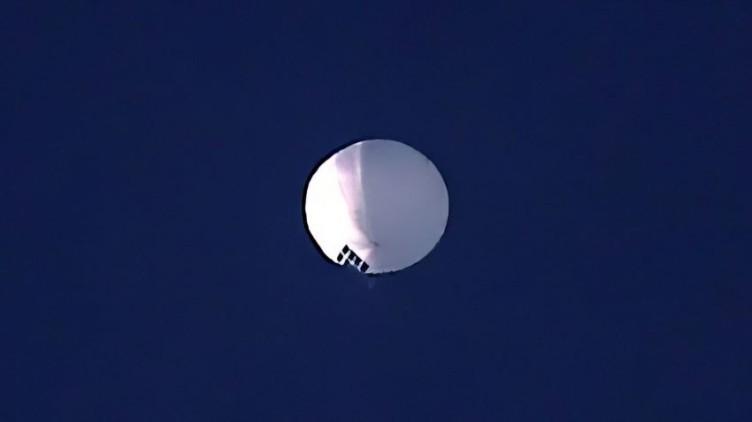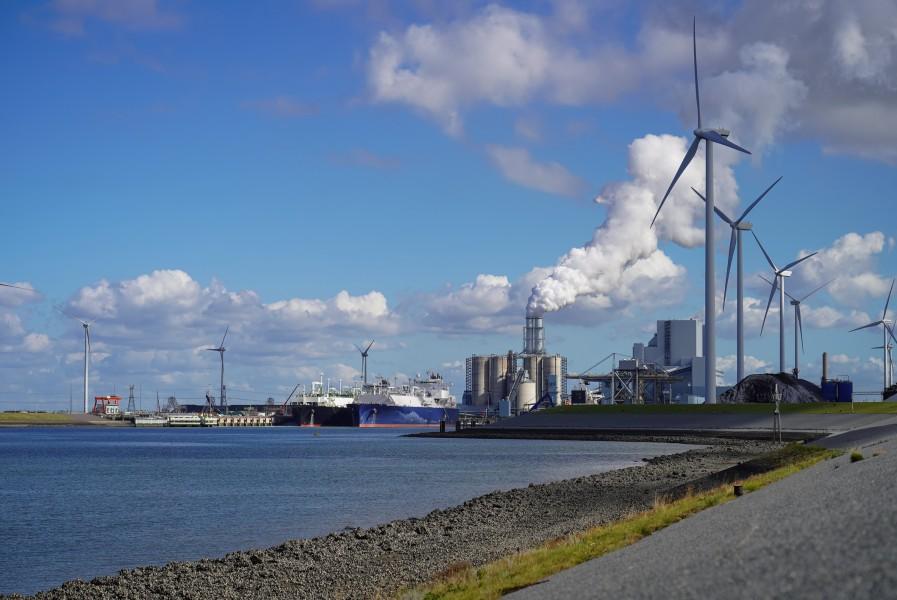“You take something off the table here,” barked Biggie Too. “Feels like we’re somewhere in peak Goldilocks,” continued the Global Chief Strategist for one of Wall Street’s Too-Big-To-Fail affairs. “At some point you get a challenge to Goldilocks – Biggie sees things and it’s coming,” he bellowed, most comfortable in 3rd person. “Maybe the dollar resumes its rally. Conviction trades rollover - investment grade, emerging markets. Not yet. Biggie feels a little back and forth first.”
Overall: “I ordered the Pentagon to shoot it down on Wednesday as soon as possible,” said President Biden, caving to the cries of the crowd. “They decided - without doing damage to anyone on the ground - they decided that the best time to do that was when it got over water,” added America’s Commander-in-Chief, acknowledging that of the many terrific uses for F-22s, engineering soft landings is not one. “Within the 12-mile limit, they successfully took it down, and I want to compliment our aviators who did it.” The media sure loved it all. Clicks, conspiracies, coverups. And presumably some Americans felt safer knowing a nation that landed a rover on the dark side of the moon and tested encrypted satellite communications using quantum entanglement technology, is no longer floating a helium balloon overhead. It reminded us that what we fear need not make much sense. The real risks, of course, are most often off the radar. One such risk is that the nation with the world’s most important economy and mightiest military is becoming increasingly difficult to responsibly govern. China’s helium balloon illustrated this disturbing fact for all those tuned in to its faint signal. But the much larger object floating overhead is the Federal Reserve’s unfathomably bloated balance sheet, which is both impossible to photograph and even more difficult to explain to the nation’s distracted citizenry. “We’ve raised rates four and a half percentage points, and we’re talking about a couple of more rate hikes to get to that level we think is appropriately restrictive,” said Chairman Powell, at the press conference. “Why do we think that’s probably necessary? We think because inflation is still running very hot,” he added. But the yield curve remained steeply inverted, dismissing Powell’s guidance, as the bond market fears sustained rate hikes when combined with the ongoing quantitative tightening campaign will precipitate a hard landing.
Marcel Kasumovich, Deputy CIO of One River Digital, published a piece on the US balance sheet issues that pose longer-term headwinds for the US dollar [click here]. This dynamic will be a structural positive for certain digital assets.
Week-in-Review: Mon: Panel at Japan Productivity Center suggested the gov’t should make the BOJ’s 2% infl target a long term goal, Israel’s new plans to allow legislatures to overrule judicial system continues to weigh on domestic assets, Israeli involvement in Iranian explosions considered likely by US, Brazil fin min Haddad expresses concern about the central bank rate, Adani Enterprises continues freefall amid allegations of corruption, Biden weighs fully cutting off Huawei from US suppliers, Sweden 4Q GDP -0.6% (1.3%e), Italy PPI 39.2% (35.7%p), EU eco conf 99.9 (97e), US Dallas Fed -8.4 (-15e), S&P -1.3%; Tue: US Employment Cost Index 1% in 4Q (1.1%e), UK mortgage approvals fall to lowest level in 2.5y (35.6k vs 45k exp), Norway’s SWF ($1.3T) lost $164b in 2022, China mfg PMI 50.1 as exp / serv 54.4 (52e) / comp 52.9 (42.6p), EU 4Q GDP 1.9% (1.7%e), US Case Shiller house prices 6.77% (6.8%e), US Chicago PMI 44.3 (45e), US cons conf 107.1 (109e), S&P +1.5%; Wed: Fed hikes 25bp as exp / keeps ref to ‘ongoing increases’ / Powell fails to meet markets hawkish expectations, EU CPI 8.5% (8.9%e) / Core CPI 5.2% (5.1%e), BREIT hit redemption limit again in January, Biden/McCarthy meet to discuss debt ceiling – signaled optimism that an agreement can be reached ‘long before’ the required date, President Xi calls for enhanced efforts to boost consumption, India’s budget delivers cap ex boost ~3.3% of GDP, COIN wins dismissal of lawsuit over unregistered securities, Caixin China PMI 49.2 (49.8e), EU final mfg PMI 48.8 as exp, Italy CPI -1.3% (-1.5%e), EU unemp 6.6% (6.5%e), EU CPI 8.5% (8.9%e) / Core CPI 5.2% (5.1%e), US ADP emp chg 106k (180k exp), US ISM mfg 47.4 (48e) / prices paid 44.5 (40.4e), S&P +1.1%; Thu: BOE hikes 50bp as exp and signals a pause could come very soon, ECB hikes 50bp as exp and signals another 50bp coming in March, Bunds have largest drop in yield since 2011, AMZN misses, GOOG misses, Apple misses, Nakaso (was the 2nd most likely candidate to be next BOJ gov) announces expanded APEC role – reducing the odds of him being next BOJ gov, US secured access to more Philippine military bases, Israeli warplanes bombed parts of Gaza Strip, US Non-Farm productivity 3% (2.4%e) / Unit Labor Costs 1.1% (1.5%e), US init claims 183k (195k exp), US factory orders 1.8% MoM (2.3%e), S&P +1.5%; Fri: US NFP 517k (188k exp) / AHE 4.4% (4.3%e) / commentators highlight the annual revisions as a risk to misinterpreting the report as convincingly strong, Blinken’s trip to China postponed amid Chinese spy balloon being found over Montana, Adani group falls 50% since Hindenburg report, GPIF posts 4th straight quarterly loss – worst run in 20y, Brazil’s Lula again pushed back on BCB independence, Fed’s Daily says ‘far too early to declare victory’ on inflation, BOE’s Pill says must avoid going too far on lifting rates, BOJ’s Kuroda says their bond holdings loss $68.5b at end of Dec (10x bigger than last year), Russia to triple FX sales to make up for plunge in energy rev, China Caixin PMI serv 52.9 (51e) / comp 51.1 (48.3p), EU final serv PMI 50.8 (50.7e) / comp 50.3 (50.2e), EU PPI 24.6% (22.4%e), Brazil IP -1.3%
(-1.2%e), US ISM serv 55.2 (50.5e), S&P -1.0%.
Weekly Close: S&P 500 +1.6% and VIX -0.18 at +18.33. Nikkei +0.5%, Shanghai -0.0%, Euro Stoxx +1.2%, Bovespa -3.4%, MSCI World +1.3%, and MSCI Emerging -1.2%. USD rose +2.7% vs Sterling, +2.6% vs Australia, +2.2% vs Sweden, +1.7% vs South Africa, +1.6% vs Russia, +1.1% vs Mexico, +1.0% vs Yen, +0.7% vs Euro, +0.6% vs Canada, +0.5% vs Brazil, +0.4% vs India, +0.2% vs China, and +0.1% vs Turkey. USD fell -4.9% vs Ethereum, -2.3% vs Bitcoin, -1.3% vs Chile, and -0.6% vs Indonesia. Gold -3.5%, Silver -5.2%, Oil -7.9%, Copper -3.9%, Iron Ore +1.8%, Corn -0.8%. 10yr Inflation Breakevens (EU +5bps at 2.18%, US -9bps at 2.23%, JP -9bps at 0.66%, and UK +6bps at 3.43%). 2yr Notes +9bps at 4.29% and 10yr Notes +2bps at 3.53%.
Jan Mthly Close: S&P 500 +6.2% and VIX -2.27 at +19.40. Nikkei +4.7%, Shanghai +5.4%, Euro Stoxx +6.7%, Bovespa +3.4%, MSCI World +7.0%, and MSCI Emerging +7.9%. USD rose +2.2% vs South Africa, +0.6% vs Turkey, and +0.3% vs Sweden. USD fell -28.7% vs Bitcoin, -24.9% vs Ethereum, -6.3% vs Chile, -3.9% vs Brazil, -3.7% vs Indonesia, -3.4% vs Australia, -3.4% vs Mexico, -2.1% vs China, -1.9% vs Sterling, -1.8% vs Canada, -1.5% vs Euro, -1.0% vs Russia, -1.0% vs India, and -0.8% vs Yen. Gold +5.6%, Silver -0.8%, Oil -2.0%, Copper +10.9%, Iron Ore +5.1%, Corn +0.2%. 5y5y inflation swaps (EU -13bps at 2.14%, US -5bps at 2.25%, JP -10bps at 0.75%, and UK -21bps at 3.41%). 2yr Notes -23bps at 4.20% and 10yr Notes -37bps at 3.51%.
Year-to-Date Equities (high to low): Ireland +15.9% priced in US dollars (+14.7% price in euros), Czech Republic +15.6% priced in US dollars (+12.8% in koruna), Italy +14.9% priced in dollars (+13.7% in euros), Mexico +14.8% (+11.5%), NASDAQ +14.7%, Taiwan +14.2% (+10.4%), Euro Stoxx 50 +13.4% (+12.2%), Spain +13.3% (+12.1%), France +12.9% (+11.7%), Russell +12.7%, Korea +12.5% (+10.9%), Germany +12.3% (+11.2%), Greece +12.3% (+11.1%), Netherlands +12% (+10.9%), Argentina +11.6% (+18.5%), Sweden +11.1% (+12.3%), Philippines +10.3% (+7%), Australia +9.4% (+7.4%), Austria +9.2% (+8.1%), HK +8.9% (+9.5%), MSCI World +8.4% priced in dollars, Russia +8.2% (+4.4%), Canada +8.2% (+7.1%), South Africa +8% (+10.6%), S&P 500 +7.7%, Hungary +7.7% (+3.7%), Chile +7.6% (+1%), China +7.5% (+5.6%), Poland +7.3% (+7%), Israel +7% (+3.4%), Belgium +6.7% (+5.6%), New Zealand +6.2% (+6.3%), UK +5.8% (+6%), Finland +5.8% (+4.7%), Switzerland +5.5% (+5.8%), Singapore +5.4% (+4.1%), Japan +5.4% (+5.4%), Thailand +4.9% (+1.2%), Indonesia +4.5% (+0.9%), Denmark +3.3% (+2.3%), Malaysia +2.4% (-0.3%), Saudi Arabia +2.3% (+2.1%), Brazil +2% (-1.1%), Colombia +1.4% (-1.8%), Portugal +1% (-0.1%), India -0.9% (-1.4%), UAE -2.8% (-2.7%), Norway -2.9% (+0.9%), Venezuela -7.1% (+24.2%), Turkey -9.8% (-9.3%).
Supply Side: “You know, 8mm Ukrainians have fled and are now in the UK and EU,” said the strategist. “And in the US, a couple million people crossed your southern border illegally last year, and they’re still coming,” he said. “If there’s something that the industrialists like about Biden, that’s the thing,” he said. “In a demand led inflation, with a shortage of labor, the natural tendency is to look for rate hikes and hard landings as the answer. And it usually is. But a large influx of labor eager to earn a living wage is an answer too. At least it helps.”
Chatter: “The good cyclical investors think we have more to run,” said the strategist. “The biggest difference between ’22 and ’23 is that most now believe there is a bull market in bonds,” he added. 10yr treasury yields have been trending lower since October, falling from 4.33% to 3.53%. 30yr yields peaked at 4.43% and now trade 3.62%. “In a bond bull market, you need a hard landing for the economy or a credit event for stocks to not go up. Bears say it’s impossible for the Fed to cut without a hard landing. And bulls say you don’t have to have either.”
2023: “This year will be about staying one step ahead of markets, so that you never find yourself on the back foot,” said the CIO atop his prodigious pile, having navigated 2022 beautifully. “I’m trying to figure out the next play after this extraordinary January,” he said. “Interest rate volatility collapsed, driving the mechanical re-risking which drove massive short-covering.” Then came rest-of-world growth vs the US. “It started with EU gas price declines and China re-opening, and then in the last few weeks reverted a bit more to US growth stock short covering.”
2023 II: “When you see the momentum factor underperform so viciously as it has in January, it is usually a sign that something is about to change,” continued the same CIO. “We’re trying to figure it out. What is the appropriate base rate is for this sort of environment?” Friday’s data caught everyone offsides because it was so hot, and it’s probably an exaggeration due to the weather. “Underlying economic momentum is stronger, this created a growth inflection instead of the assured recession which most leading indicators have been pointing to. And therefore, we’re in the phase where we will start pushing out the rate cuts.”
2023 III: “People came into the year underweight,” continued the CIO. “The strong belief was that markets will be bad in the 1st half, the Fed will cut rates in the 2nd half, then we can get re-involved. And sure, maybe we end up right back at 4000 in the S&P 500, but you want to start the year cautious and then re-risk,” he said. “Now that profile is in the process of inverting. Or if not exactly inverting, at least it appears it will play out quite differently. Perhaps markets start up, then down, then up again. 2023 will be a difficult year, it’ll have a very different profile.”
Anecdote: “I attempt to tap into young men’s minds and souls,” said Coach Amplo. “Activate what they care about, have them get in touch with that feeling, and act on it in a meaningful way.” Amplo made his name early, achieving the impossible, building a lacrosse program from scratch into a team that made it to the NCAA Division I tournament in four years. He assembled what most considered unremarkable talent and produced extraordinary results. “For many years I struggled to articulate what I was trying to accomplish. It was more of a feeling. But I have come to see my role as striving for three things: shared connection, vulnerability, and purpose.” Amplo went on to coach Team USA to a gold medal in 2018. Now he is Head Coach for Navy’s Division I program. “Principal amongst these is vulnerability. The courage to expose ourselves to heartbreak. Failure. I want my young men to fall in love with the team, with one another, with their shared purpose. You cannot fall in love without having the courage to risk pain. But the reward of love is everlasting,” he said. “Most relationships are surface level. It takes time, intensity of shared experience, and common suffering to penetrate that barrier; these are things my young men endure at the academy and on my field.” Filling one’s life with great coaches as mentors and teachers is fundamental to success. This applies to sports, business, marriage, parenting, life. “A sign that tells me a group of young men has transformed itself into a real team is when I see sacrifice. When Jackson accepted his role as a defensive midfielder, it was an example of that. It took vulnerability and courage to give up his personal ambition to be a star offensive player, for the betterment of the team,” he said of my oldest son. “And he now has a deeper connection with his teammates, and more importantly, he has an even deeper connection to the team, and holds a desire to win so badly it hurts,” said Amplo. “I just want to see that out there, no matter whether we hoist the trophy or not.”
Good luck out there,
Eric Peters
Chief Investment Officer
One River Asset Management
Disclaimer: All characters and events contained herein are entirely fictional. Even those things that appear based on real people and actual events are products of the author’s imagination. Any similarity is merely coincidental. The numbers are unreliable. The statistics too. Consequently, this message does not contain any investment recommendation, advice, or solicitation of any sort for any product, fund or service. The views expressed are strictly those of the author, even if often times they are not actually views held by the author, or directly contradict those views genuinely held by the author. And the views may certainly differ from those of any firm or person that the author may advise, converse with, or otherwise be associated with. Lastly, any inappropriate language, innuendo or dark humor contained herein is not specifically intended to offend the reader. And besides, nothing could possibly be more offensive than the real-life actions of the inept policy makers, corrupt elected leaders and short, paranoid dictators who infest our little planet. Yet we suffer their indignities every day. Oh yeah, past performance is not indicative of future returns.





